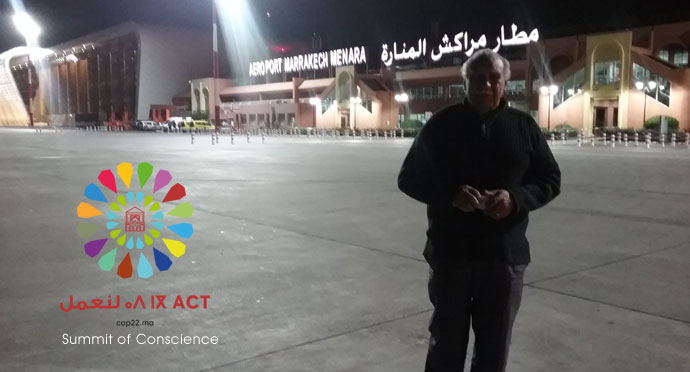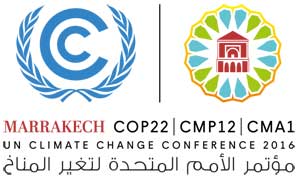Feedback from COP22 Climate Summit Marrakech
First Nations Peoples must demand our participation in the planning of Australia’s climate change strategies, which they have agreed to, at the Paris conference.

Ghillar Michel Anderson at the airport after attending the COP22 Morocco Climate Summit Marrakech 2016

Ghillar Michael Anderson 8 November 2016
Feedback from COP22 Climate Summit Marrakech


First it's important to know that the delay in countries signing the Paris Agreement was caused by both Australia and the USA threatening to walk away if other parties refused to permit various out clauses.
Notable and critical examiners of the Paris Agreement all agree that the symbolism was great for the world facing catastrophies because of climate change, especially those of the small Pacific Islands and low coast lands.
In reality the Paris Agreement leaks like a sieve and permits too many escape clauses for the major polluters and countries promoting extractive industries, despite the overall great objectives of the Paris Agreement.
As Aboriginal Peoples of the world the Paris Agreement acknowledges us in the preamble where it states:
"The Paris Agreement affirms the importance of traditional knowledge of Indigenous Peoples as well as local knowledge systems in adaptation to climate change. Indigenous Peoples' traditional knowledge related to their food sources and subsistence practices, flora and fauna and relationships with their traditional lands, waters and other natural resources are the basis of their traditional economics as well as their cultures, identity and spirituality. Indigenous Peoples' inherent rights to their lands, cultural heritage, traditional knowledge, land, resources and subsistence practices are affirmed and recognised in the UN Declaration on the Rights of Indigenous Peoples.
The Paris Agreement specifically recognises the importance of Indigenous Peoples' traditional knowledge in adaption actions and in recognition of the need to strengthen such knowledge, technologies, and practices it establishes a platform for the exchange of experience and sharing of best practices on mitigation and adaptation in a holistic integrated manner."
Aboriginal Peoples' are also referred to and included in Article 7 at paragraph 136, decision of 1/COP21. It was agreed to in Paris, that governments should establish platforms for the engagement of Aboriginal Peoples' in their Nationally Determined Contributions (NDC) to climate change strategies.
This framework is intended to ensure Aboriginal participation in government strategic planning for Sustainable Development Mechanisms (SDM) under Article 6, paragraph 4 of the Paris Agreement. This strategic planning by National Governments do have serious implications for us and our land and environment, our waters, and eco-systems alike.
If any of our people in Australia are engaged in this program of engagement and planning, then we as communities Australia wide must be made aware of this engagement, because there are indeed some very serious implications for our Peoples' nationally.
It was disappointing to see NO Aboriginal political activists in attendance and only representatives from the Pacific Islands speaking on issues that also impact us on mainland Australia. My collaboration with the Pacific Island representative ensures a key discussion point in the continued impact of the extractive industries and we call for the total ban on issuing more coal and uranium mining licences and to stop Coal Seam Gas extraction because of the threat it poses to our aquifers especially in the Pilliga Scrub.
In regards to Aboriginal representation, not even Congress attended. I did, however, meet up with two representatives from the Kimberley, who were attending to promote their Carbon offsets, by showing the effects of traditional burning as a micro offset to mitigate carbon emissions and thereby contributing to the overall climate change objectives, while at the same time generating income which is derived from the commonwealth government program of Carbon Trading Offsets.
The Aboriginal Caucus here in Marrakech have adopted the view that:
"Scientific data shows that collective ownership and integral titling of land, territories and resources of Aboriginal Peoples, as well as respect for customary use and management are the most effective ways of protecting fragile eco-systems and thereby contributing to adaptation and mitigation."
The Caucus also remonstrated that:
"Reliance on carbon trading, carbon credits and carbon offsets should not be allowed. The National Determined Contributions (NDC) of governments should not be compromised by carbon offsets. States should not be allowed to use offsets and market mechanisms to dilute their reductions of emissions. It is time to cease many State attitudes, both developed and developing, and cease to see solutions to climate change as an opportunity for the generation of wealth."
The Caucus also argues that:
"True solutions to climate change require drastic reductions of emission of carbon and other greenhouse gasses, not more development that does little or nothing to reduce carbon emissions. As proven by the history of the Clean Development Mechanism and the use of carbon credits and offsets generally, these so-called solutions to climate change actually experienced an increase in emissions."
The Aboriginal Caucus of 2016 to the COP22 calls on National Governments to understand that Aboriginal Peoples of the world are under threat and argue that:
"The Rights of Aboriginal Peoples' are seriously implicated in these matters and our concerns must be taken into account. The NDCs must ensure full and effective participation of Aboriginal Peoples in their development of their State strategies. The NDCs must not include false solutions such as building large scale Hydro-electric dams that displace Peoples' from their territories, nor should they effect the mining of uranium as an easy way to solving pollution by fossil fuels. The strategies must include guidelines for robust social and environmental safeguards for all Peoples."
Consequently, we must demand our participation in the planning of Australia’s climate change strategies, which they have agreed to, at the Paris conference.
COP22 is the 2016 UN Climate Change Conference
 Contact: Ghillar Michael Anderson
Contact: Ghillar Michael AndersonConvenor of the Sovereign Union,
Head of State of the Euahlayi Peoples Republic
Contact Details here

